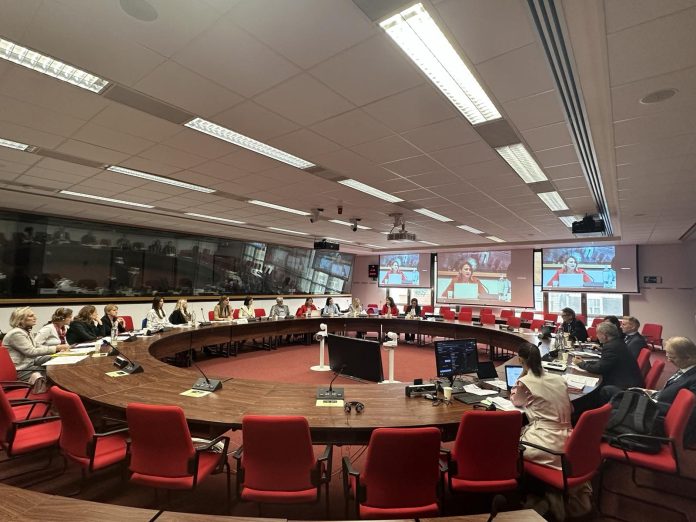At today’s Subcommittee on trade, industry, customs and taxation meeting between the EU and Montenegro, held in Brussels, representatives of Montenegrin institutions presented the results achieved in the following chapters: Free movement of goods, Taxation, Enterprise and Industrial Policy, Customs union and External relations, since the previous meeting which was held in October last year.
The meeting was co-chaired by Michael Miller, Head of Unit for Montenegro and Serbia at the Directorate-General for Neighbourhood and Enlargement Negotiations of the European Commission, and by Jovana Krunić, Director-General at the Ministry of Economic Development and Tourism of Montenegro.
“The renewed political focus on enlargement gives Montenegro an opportunity to advance on the EU path. The proper functioning of the new parliament and the formation of a new government are essential to achieve this, as are institutions that are empowered and committed to take forward EU-related reforms“, Michael Miller emphasised. In the area of trade, the EU side welcomed Montenegro’s alignment with the EU sanctions regime so far, and it underlined the importance of making progress on issues covered by this Sub-Committee for bringing Montenegro closer to the EU single market. The EU side also welcomed measures taken to tackle tobacco smuggling, but underlined that significant challenges remain to eradicate illicit tobacco trade, including destruction of seized assets.
Director-General at the Ministry of Economic Development and Tourism of Montenegro, Jovana Krunić, said that Montenegro is an active promoter of regional cooperation, and participates in more than 30 regional initiatives and platforms, with a particular emphasis on its role as the chair of regional mechanisms, contributing to the lasting positioning of our country and the economies of the region on the European map.
She pointed out that in Chapter 1 – Free movement of goods, there is a need to make further progress when it comes to alignment of the national legislation with the EU acquis, having in mind that this chapter is very complex and that it is very important for the functioning of the EU Single Market.
When it comes to Chapter 16 – Taxation, she underlined that the Parliament has adopted the following laws: Law on Amendments to the Law on Corporate Income Tax, the Law on Amendments to the Law on Excise Tax and the Law on Amendments to the Law on Value Added Tax and that Montenegro recognizes the importance of further strengthening of administrative capacities with the aim of implementing tax legislation
Krunić also referred to the Chapter 20 – Enterprise and Industrial Policy, where Montenegro continues activities on the implementation of the Industrial Policy of Montenegro. „In terms of entrepreneurial policy, the activities of implementing the SMEs Development Strategy, the Strategy for the Development of Women’s Entrepreneurship are continuous, also different program lines of financial and non-financial support to the SME sector, strengthening their innovative and technological capacities, etc.“, said Krunić.
Furthermore, she underlined that in the framework of Chapter 29 – Customs Union, Montenegro worked hard in the previous period on the adoption of new customs legislation, so that at the moment, it records a high degree of harmonization with the EU acquis.
When it comes to the Chapter 30 – External relations, she concluded that Montenegro continued to coordinate its position with the positions of the EU, including positions within the World Trade Organization.
Montenegro undelined that it continues with good results in the field of trade and approach to the EU single market and remains committed to implementing reforms that are aligned with EU acquis and standards, which will accordingly lead to further progress towards its’ EU path, the 16th EU-Montenegro Sub-Committee on Trade, Industry, Customs and Taxation pointed out.
MINISTRY OF EUROPEAN AFFAIRS


